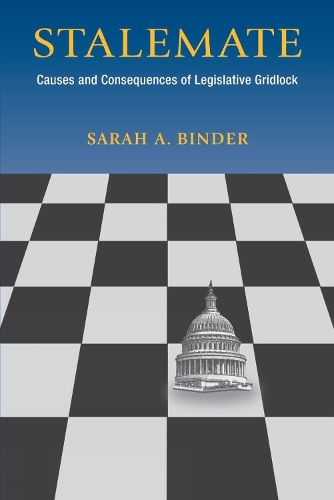
Stalemate: Causes and Consequences of Legislative Gridlock
(Paperback)
Publishing Details
Stalemate: Causes and Consequences of Legislative Gridlock
By (Author) Sarah A. Binder
Bloomsbury Publishing PLC
Brookings Institution
25th February 2003
United States
Classifications
Professional and Scholarly
Non Fiction
328.73
Physical Properties
Paperback
222
Width 151mm, Height 229mm, Spine 11mm
358g
Description
Critics of American politics have long lamented legislative stalemate as an unfortunate byproduct of divided party government, charging that it brings unnecessary conflict, delays and ineffective policies. Although the term "gridlock" is said to have entered the American political lexicon after the 1980 elections, legislative stalemate is not a modern invention. Alexander Hamilton complained about it more than two centuries ago. In "Stalemate", Sarah Binder examines the causes and consequences of gridlock, exploring the ways in which elections and institutions together limit the capacity of Congress and the president to make public law. Binder illuminates the historical ups and downs of policy stalemate by developing an empirical measure to assess the frequency of gridlock in each Congress since World War II. Her analysis weaves together the effects of institutions and elections, and shows how both intrabranch and interbranch conflict shape legislative performance. Binder also explores the consequences of legislative gridlock, assessing whether and to what degree it affects electoral fortunes, political ambitions and institutional reputations of legislators and presidents alike.
Reviews
"In this cogent account of the theory and practice of legislating in the American system, Sarah Binder demonstrates that party and bicameralism matter. Binder shows that differences in policy views across institutions might slow the enactment of new law, force compromise, or even produce stalemate. If she's right, and I think she is, then every American who cares about the quality of national governance must understand her argument and evidence." Steven S. Smith, Washington University in St. Louis, 2/1/2003
|"One way to analyze lawmaking is to see how many bills pass as a proportion of proposals seriously considered. This book carries out that logic exceptionally well. Along the way it offers many nice insights about bicameralism, the Senate, the Clinton era, and in general the whys and wherefores of legislating. For students of Congress the book is a must-read." David R. Mayhew, Yale University, 2/1/2003
|" Stalemate: Causes and Consequences of Legislative Gridlock is a persuasive and innovative book and it is this reader's hope that it will be a launching point for a new avenue of research on U.S. federal policy making." Wendy J. Schiller, Brown University, Congress & The Presidency, 9/1/2003
|"In this superb book, Sarah Binder addresses several questions that are central to contemporary scholarship about American national government.... This brief volume is a major addition to the scholarly literature about lawmaking, and thus merits sustained attention from scholars and graduate students.... Stalemate is a remarkable book." C. Lawrence Evans, College of William and Mary, Perspectives on Politics, 3/1/2004
|"... don't be misled by the size of the book. Binder has produced a deep and insghtful work that ranges from the views and expectations of the Framers to the unexpected development of an activist and vibrant Senate and the rising role of parties to the contemporary Congress, offering a slew of hypotheses about what stalemate is, when and why it occurs, and a creative and rich data analysis of more than five decades of congressional performance with which to test them.... This is a fine book filled with insights: a case study in careful, systematic, and nuanced research that should be read by anyone interested in legislatures and in policy making generally." Norman J. Ornstein, The American Enterprise Institute, Political Science Quarterly, 4/1/2004
|"Binder makes a solid contribution to a continuing scholarly discussion of the causes and consequences of legislative stalemate." R. E. Dewhirst, Northwest Missouri State University, Choice, 11/1/2003
|"Using 54 years of institutional, electoral, partisan, and policy material, Sarah Binder has written a commanding study of the incidence, the explanation, and the consequences of divided government and bicameral deadlock in Congress. Innovative in its exploratory range and its explanatory precision, Stalemate is contemporary political science at its very best. It is a 'must-read' book for all who wonder and worry about the performance and possibilities of our national policymaking institutions.
" Richard Fenno, Distinguished University Professor and Kenan Professor of Political Science, University of Rochester, 2/1/2003
Author Bio
Sarah Binder is a senior fellow in Governance Studies at the Brookings Institution and an associate professor of political science at George Washington University. Her previous books include Minority Rights, Majority Rule: Partisanship and the Development of Congress (Cambridge University Press, 1997) and (with Steven S. Smith) Politics or Principle: Filibustering in the United States Senate, (Brookings, 1997).
